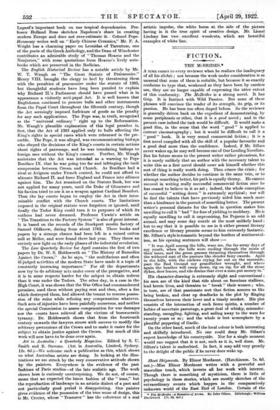FICTION.
'Till MeBRIDES.* A TIME comes to every reviewer when he realizes the inadequacy of all his clichis ; not because the work under consideration is so unusual that none of them is suitable, but because it so exactly conforms to type that, weakened as they have been by careless use, they are no longer capable of expressing the utter extent of this conformity. The McBrides is a strong novel. It has Grip. It is Instinct with Wild Passion. But none of these
phrases will convince the reader of its strength, its grip, or its passion. He has been too often duped before. So the reviewer
is generally driven back on the expedient of demonstrating, by some periphrasis or other, that it is a good novel ; and in the present case indeed the task would be difficult. It would make a good film, in the sense that the word " good " is applied to
current cinematography ; but it would be difficult to call it a " good " book. It is very sound commercial fiction ; it is a first novel compiled with all the skill of a popular favourite and a good deal more than the confidence. Indeed, if Mr. Sillars never wakes up, he may well become one of Our Leading Novelists.
But his future seems to the present writer rather precarious, for it is surely unlikely that an author with the necessary talent to write this as a first novel should never ask himself whether this sort of thing is really worth doing. Then comes the crisis ; for whether the author decides to continue in the same vein, or to
attempt something better, his path is equally thorny. He cannot succeed in writing really successful commercial fiction once he has ceased to believe in it as art ; indeed, the whole conception of successful " writing down " is extremely mythical ; nor will he find the talents that have previously aided him much more than a hindrance in the pursuit of something better. The present
writer's personal distaste for the book in question makes him unwilling to call it " bad " for fear of yielding to snobbery. He is equally unwilling to call it unpromising, for Pegasus is an odd animal, and may some day nuzzle at the most unlikely hand ; but to say that it is possible to see in it either present literary excellence or literary promise seems to him extremely fantastic.
Mr. Sillars's style is romantic beyond the borders of sentimental- ism, as his opening sentences will show :-
" It was April among the hills, woes me, the far-away days of my youth, when the hills were smiling through the mists of their tears, and the green grasses thrusting themselves through the withered mat of the pasture like slender fairy swords. April in the hills, with the curlews crying far out on the moorsicle, past the Red Ground my grandfather wrought, and where again the heather will creep down, rig on rig, for all the stone dykes, deer fences, and tile drains that ever a man put money in."
His character-drawing is extremely slight and conventional ; his men are of the kind that ride about on ferocious stallions, lead heroic lives, and threaten to " break " their women ; who, in turn, are of that passionate sort that fiction assures us like being broken, and clear up deadlocks in the plot by flinging themselves between their lover and a timely musket. His plot consists of the interaction of such fierce spirits, a number of babies of uncertain parentage, a great deal of whisky, misunder- standing, smuggling, fighting, and sailing away to the wars for twenty years or so ; and the whole is lent atmosphere by a plentiful peppering of Gaelic.
On the other hand, much of the local colour is both interesting and skilfully introduced. No one could deny Mr. Sillars's expert knowledge of his countryside. Nor for a single moment would one suggest that it is not, such as it is, well done. Mr. Sillars's talent is undoubted. In fact, it may add very greatly to the delight of the public if he never does wake up.


































 Previous page
Previous page